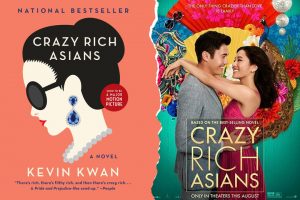 This movie is basically a generic Hollywood romantic comedy that uses several common tropes: an overly-protective mother who threatens the relationship during a dramatic meeting-of-the-family, a catty bachelorette party and bro-y bachelor party, the setting of a friend’s wedding as an opportunity for the main couple to realize how much they love each other, and even the ostentatious professing of one’s love as their lover is about to fly off in a plane. The thing that differentiates this movie from any other generic romcom in the United States is simply that is has been Asian-ified.
This movie is basically a generic Hollywood romantic comedy that uses several common tropes: an overly-protective mother who threatens the relationship during a dramatic meeting-of-the-family, a catty bachelorette party and bro-y bachelor party, the setting of a friend’s wedding as an opportunity for the main couple to realize how much they love each other, and even the ostentatious professing of one’s love as their lover is about to fly off in a plane. The thing that differentiates this movie from any other generic romcom in the United States is simply that is has been Asian-ified.
First, this movie is filmed throughout Malaysia and Singapore. Singapore is seen today as a prosperous, technologically and financially innovative hub. 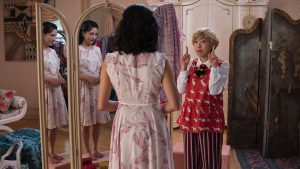 Singapore has also been rated by The Economist as the most expensive city to live in for the last five years. There are a couple of scenes that are a nice celebration of the luxurious city of Singapore, featuring the bustling street food district, mansions with beautiful décor, and glamorous dresses worn at the parties.
Singapore has also been rated by The Economist as the most expensive city to live in for the last five years. There are a couple of scenes that are a nice celebration of the luxurious city of Singapore, featuring the bustling street food district, mansions with beautiful décor, and glamorous dresses worn at the parties.
Second, it seems like all known and up-and-coming Asian actors are featured in this film. The main character Rachel is in ABC’s series Fresh Off the Boat; the protective mother Eleanor is best known from Crouching Tiger, Hidden Dragon; the cousin Astrid starred in BBC’s show Humans while the cousin Bernard stars in Silicon Valley; cousin Eddie is comedian Ronnie Chieng from the Daily Show; Rachel’s friend Peik Lin appeared in the recent Ocean’s 8 movie; and there are cameos by actors like Harry Shum Jr, known from Glee, and Ken Jeong, known from Community and Hangover.
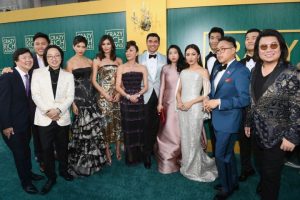 After some negotiations, this film was distributed by Warner Bros and the director was allowed free rein on casting. (One prospective producer was pushing for a white actress for Rachel, but the author of the book the movie is based on insisted on a different producer.) The director, the cast, and the author were all thrilled to see that this film had an all-Asian cast and a big theatrical release. This movie made good box office money ($238 million worldwide) and received lots of positive reception and press for its take on the standard romcom. The cast includes Asian actors from around the world, simultaneously displaying a diversity of Asian actors and uniting them through a shared experience in the historically white-washed industry of Hollywood. (There was some controversy about casting choices such as Sonoya Mizuna—of Japanese and Argentinian decent—as a character who is supposed to have grown up in Singapore, but overall people have celebrated the diversity displayed on the big screen.)
After some negotiations, this film was distributed by Warner Bros and the director was allowed free rein on casting. (One prospective producer was pushing for a white actress for Rachel, but the author of the book the movie is based on insisted on a different producer.) The director, the cast, and the author were all thrilled to see that this film had an all-Asian cast and a big theatrical release. This movie made good box office money ($238 million worldwide) and received lots of positive reception and press for its take on the standard romcom. The cast includes Asian actors from around the world, simultaneously displaying a diversity of Asian actors and uniting them through a shared experience in the historically white-washed industry of Hollywood. (There was some controversy about casting choices such as Sonoya Mizuna—of Japanese and Argentinian decent—as a character who is supposed to have grown up in Singapore, but overall people have celebrated the diversity displayed on the big screen.)
Third, this movie heartily leans into some stereotypes. Rachel is the epitome of an immigrant success story in America, where the parents (in this case a single mother) worked themselves to the bone to provide their child with opportunities; Rachel then goes on to get a stable, intellectual job (a professor) in a well-respected field (economics) at a well-respected school (NYU) among the Asian-American community. I’m sure many Asian-Americans can relate to the sacrifices made by their parents for the opportunities given to them, as well as the guidelines presented to them as acceptable professions to pursue. (Humorously, most of the actors in this movie confessed how they had to go against their parents’ wishes for them when they decided to pursue their career as an actor or comedian).
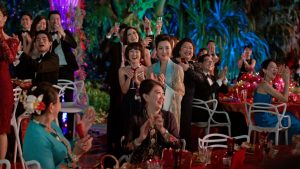 But then there is another level of success and prestige presented. Nick comes from one of the richest families in Singapore, and his friend’s wedding is basically “the event of the year” in Singapore. Nick’s cousins are all multi-millionaire successes (eg. one is a banker, another is a fashion icon, another is big in the movie industry, and all seem to own at least some property). In comparison to this extravagance, Rachel’s success appears humble and middle-class, but the concern for prestige and constant comparison to peers is the same. Nick’s mother also defines herself by the sacrifice she made for the sake of her family, though obviously the expected fortune of the children is on a different level than for families like Rachel’s.
But then there is another level of success and prestige presented. Nick comes from one of the richest families in Singapore, and his friend’s wedding is basically “the event of the year” in Singapore. Nick’s cousins are all multi-millionaire successes (eg. one is a banker, another is a fashion icon, another is big in the movie industry, and all seem to own at least some property). In comparison to this extravagance, Rachel’s success appears humble and middle-class, but the concern for prestige and constant comparison to peers is the same. Nick’s mother also defines herself by the sacrifice she made for the sake of her family, though obviously the expected fortune of the children is on a different level than for families like Rachel’s.
Rachel grapples with the cultural identity struggle of “not being Asian enough,” having grown up in the United States and having never been back to any part of Asia. She fears being seen as a “twinkie” (sometimes people say “banana,” but basically when you look Asian but act white),  and has to prove herself while making dumplings, speaking the language, or other tests of her “Chinese-ness.” Since Rachel grew up in the U.S., Nick’s mother thinks of her as different, saying that Americans only think of their own happiness instead of being able to sacrifice for their whole family. There is certainly some truth in this difference in mentality in how much value is placed on personal happiness and the pursuit of the American Dream. This is sometimes a point of tension between generations. This is also sometimes why immigrants choose to live in America.
and has to prove herself while making dumplings, speaking the language, or other tests of her “Chinese-ness.” Since Rachel grew up in the U.S., Nick’s mother thinks of her as different, saying that Americans only think of their own happiness instead of being able to sacrifice for their whole family. There is certainly some truth in this difference in mentality in how much value is placed on personal happiness and the pursuit of the American Dream. This is sometimes a point of tension between generations. This is also sometimes why immigrants choose to live in America.
With the Asian cast and setting, many Asian-Americans found this movie to be one of the first to really represent them on the big screen (given that the character Rachel is American, this story probably resonates most with Asian-Americans). This movie normalizes things like making dumplings as a family, playing mahjong, or the experience of being raised by your grandma because your parents had to work in a different country. The scene playing mahjong even requires an understanding of the rhythm of the game, as it functions as a face-off between Rachel and Eleanor and the viewer needs to appreciate the significance of Rachel forsaking the 8 to let Eleanor win instead of winning herself.
Other than the uniquely Asian aspect of the movie, the movie does not offer too much with its storyline (as it goes with many romcoms). The whole “test” of the relationship could basically be resolved by better communication. The fact that Rachel knew so little about Nick’s family and upbringing means that Nick and Rachel probably don’t know each other well enough to be committing to spend the rest of their lives together, especially since they both think family is very important. I find it hard to be convinced that a relationship can be fixed by dramatic demonstrations of your love rather than improved, honest communication, so the idea of an ostentatious proposal as a fix after a big fight seems concerning to me.
I also had a hard time relating and empathizing with most of the characters due to the extreme amount of wealth. In general, this level of wealth is a level of wealth I can’t and don’t wish to comprehend. Even Astrid, who supposedly is the one with the biggest heart, seems out of touch with normal people and simply gives a lot of money to charities. 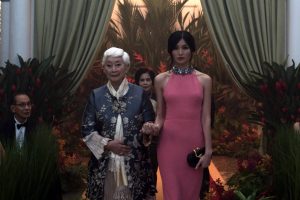 She is obsessed with materials things, obsessively buying nice shoes and jewelry for herself. When her marriage is breaking down, she does not seem to understand why her lifestyle might be incompatible with her husband, who is from a more humble background instead of a family of money. He is clearly suffering from constantly feeling like a failure for not making enough money and damaging the prestige of her family. The only way she seems to know how to deal with his pain is by buying him more things or hiding the things she bought for herself. While she should not be responsible for his feeling of self-worth and happiness, she is quick to blame him for not being enough of a man rather than acknowledging his pain. Their breakup is presented as a “strong independent woman” moment (she says it is “not her job to make him feel like a man”), but that is quickly cancelled out when the ending credits show her exchanging glances with a new man as the conclusion of her story arc.
She is obsessed with materials things, obsessively buying nice shoes and jewelry for herself. When her marriage is breaking down, she does not seem to understand why her lifestyle might be incompatible with her husband, who is from a more humble background instead of a family of money. He is clearly suffering from constantly feeling like a failure for not making enough money and damaging the prestige of her family. The only way she seems to know how to deal with his pain is by buying him more things or hiding the things she bought for herself. While she should not be responsible for his feeling of self-worth and happiness, she is quick to blame him for not being enough of a man rather than acknowledging his pain. Their breakup is presented as a “strong independent woman” moment (she says it is “not her job to make him feel like a man”), but that is quickly cancelled out when the ending credits show her exchanging glances with a new man as the conclusion of her story arc.
As a side note, there is also the weird part when Peik Lin’s little brother creepily takes photos of Rachel. It is spun as comedy and endearingly awkward, but I believe it is quite creepy and should not be encouraged with laughter, on or behind the screen…
Overall, I am happy that this movie was made, as it represents our society’s constant push for and increased value placed on diverse representation in different industries. The storyline is nothing special, but I appreciated the little touches that speak especially to Asian-Americans.
